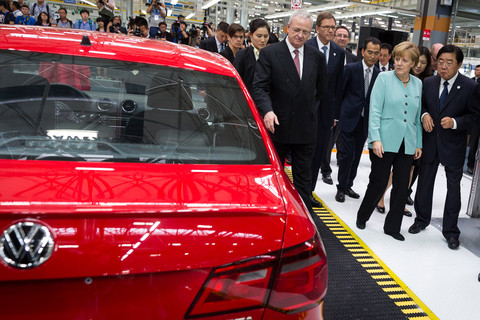EU court rejects VW defence in ‘Dieselgate’ scandal

German car maker Volkswagen (VW) deliberately cheated EU emissions tests by installing “defeat devices”, the EU’s top court has ruled, rejecting the firm’s claim the technology was meant to protect engines.
“A defeat device which systematically improves, during approval procedures, the performance of the vehicle emission control system so as to observe the emission limits set by [EU law]” cannot be excused on grounds it “contributes to preventing the ageing or clogging up of the engine,” the EU Court of Justice in Luxembourg said on Thursday (17 December).
The “device” in question “detects and guarantees that emission limits are observed only when those conditions correspond to those applied during approval procedures”, which were different to those during “normal driving conditions”, the court added.
“In order to be justified, the presence of such a device must allow the engine to be protected against sudden and exceptional damage” or “immediate risks of damage which give rise to a specific hazard,” the court noted.
And the EU emissions law would be “rendered meaningless and deprived of any useful effect” if car makers, such as VW, were entitled to install the devices “with the sole aim of guarding the engine against clogging”, the court said.
The ruling harked back to one of the biggest scandals in the EU single market in modern times, known as “Dieselgate”.
It broke in 2015 when the US Environmental Protection Agency detected the cheat devices in VW vehicles.
The German company later admitted to fitting them in 11 million cars worldwide, including millions in Europe.
It has already cost the firm €30bn in fines and civil settlements and led to mass-scale vehicle recalls.
The EU court case stemmed from one in France, in which the Paris prosecutor’s office was investigating whether VW had knowingly deceived its customers.
The EU court, earlier this year, also ruled that customers could sue the German company in their home countries, instead of in Germany, facilitating litigation, as the financial and reputational harm from the fiasco continued to drag out.
Dieselgate also implicated German car manufacturer Audi, amid signs of wider abuse in the industry.
And Thursday’s EU verdict was welcomed by environmental activists.
“This landmark ruling is good news for getting cleaner air in Europe,” Jens Müller, from Transport & Environment, an NGO umbrella group, told the AP news agency.
It meant that “national authorities can’t allow carmakers to prioritise profits over our health anymore. Now there are no more excuses: Manipulated cars must be fixed and consumers must be compensated across Europe,” Müller said.
The “consumer-friendly” EU ruling would act as a guide for national authorities’ investigations into malpractice all over Europe, Claus Goldenstein, a German consumer lawyer, also told the Bloomberg news agency.
But the EU court verdict did not comment on financial compensation for cheat-car owners, prompting VW to say it would have no impact on ongoing legal disputes, AP reported.
*** This article has been archived for your research. The original version from EUobserver can be found here ***